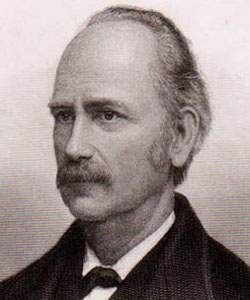Nathaniel Barratt Smithers (Dickinson Chronicles)
Scholarship
Nathaniel Smithers was born in Dover, Delaware on October 8, 1818 the son of county prothonotary Nathaniel and Susan Fisher Barratt Smithers. He was educated at Ezra Scovell's school in Dover and then at the West Nottingham Academy under Rev. James Magraw. He gained his undergraduate degree at Lafayette College in Easton, Pennsylvania in 1836 and then, after funding his further education with teaching for a year in Maryland, entered the law department of Dickinson College, in Carlisle, Pennsylvania with the class of 1840. He was admitted to the Dover bar and practiced for many years there, beginning in 1841.
As a Whig, he turned down the nomination to run for Congress in 1844 but did serve as clerk of the State Legislature in 1845 and 1847. He was a delegate to the Whig Convention in Philadelphia that nominated Millard Fillmore in 1848. He became estranged with the mainstream of the Whigs in the state when the party rejected the gradual abolition of slavery and voted in local option concerning alcohol in 1847. He co-operated with the American Party but did not become a member. He was a chair of the state delegation to the Republican Convention in Chicago that nominated Lincoln. Smithers served as secretary of state for Delaware under Governor Cannon from January till November 1863 when he was elected to the U.S. Congress to fill a vacancy opened with the death of Democrat William Temple. While there he served on the critical Special Committee of Reconstruction and helped turn down the efforts of Arkansas and Louisiana members to be re-admitted. He also shepherded the amendment through Congress which abolished the purchase of relief from the draft. At the Baltimore Republican Convention in 1864, he was a member of the executive committee but did not support Andrew Johnson's nomination as vice-president. By now an Unconditional Unionist, he was defeated after that one term by fellow Dickinsonian John Anthony Nicholson, a Democrat, in 1864 and returned to private practice. He did continue to lead the Delaware Republican delegation, in 1868 nominating Grant and in 1880 voting for Blaine. Back in Dover, he was president of the First National Bank and served on the school board. Dickinson College awarded him the honorary doctorate in 1890.
He was married to Mary Smithers, a half cousin, and the couple had four children, only one of whom survived into adulthood. Her brother was Enoch Joyce Smithers. After Mary's death, he married Mary Barratt Townsend of Frederica, Delaware. Nathaniel Barratt Smithers died in Dover on January 16, 1896 and was buried in the Old Methodist Century there. He was eighty-seven years old.
As a Whig, he turned down the nomination to run for Congress in 1844 but did serve as clerk of the State Legislature in 1845 and 1847. He was a delegate to the Whig Convention in Philadelphia that nominated Millard Fillmore in 1848. He became estranged with the mainstream of the Whigs in the state when the party rejected the gradual abolition of slavery and voted in local option concerning alcohol in 1847. He co-operated with the American Party but did not become a member. He was a chair of the state delegation to the Republican Convention in Chicago that nominated Lincoln. Smithers served as secretary of state for Delaware under Governor Cannon from January till November 1863 when he was elected to the U.S. Congress to fill a vacancy opened with the death of Democrat William Temple. While there he served on the critical Special Committee of Reconstruction and helped turn down the efforts of Arkansas and Louisiana members to be re-admitted. He also shepherded the amendment through Congress which abolished the purchase of relief from the draft. At the Baltimore Republican Convention in 1864, he was a member of the executive committee but did not support Andrew Johnson's nomination as vice-president. By now an Unconditional Unionist, he was defeated after that one term by fellow Dickinsonian John Anthony Nicholson, a Democrat, in 1864 and returned to private practice. He did continue to lead the Delaware Republican delegation, in 1868 nominating Grant and in 1880 voting for Blaine. Back in Dover, he was president of the First National Bank and served on the school board. Dickinson College awarded him the honorary doctorate in 1890.
He was married to Mary Smithers, a half cousin, and the couple had four children, only one of whom survived into adulthood. Her brother was Enoch Joyce Smithers. After Mary's death, he married Mary Barratt Townsend of Frederica, Delaware. Nathaniel Barratt Smithers died in Dover on January 16, 1896 and was buried in the Old Methodist Century there. He was eighty-seven years old.
John Osborne and James W. Gerencser, eds., “Nathaniel Barratt Smithers,” Dickinson Chronicles, http://chronicles.dickinson.edu/encyclo/s/ed_smithersNB.htm.


